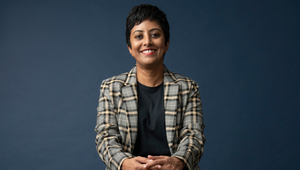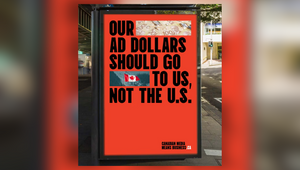
5 Minutes with… Bjoern Bremer

If Hamburg is the brain of the German advertising industry, and Frankfurt and Dusseldorf the well-muscled arms, then Berlin is the vibrant, creative heart. As artists, musicians, creatives and general hipsters flock to the city, it’s seen the rise of young and edgy agencies that are racing ahead of the traditional advertising pack – but whether or not clients will follow is yet to be seen. M&C Saatchi CCO Bjoern Bremer talks LBB’s Laura Swinton through the complexities of the German market.
LBB> M&C Saatchi have been in Berlin for seven years – how has the agency grown and evolved in that time?
BB> Let me begin a couple of years before hand. We were a small agency, a tiny agency called International. We won some very big pieces of Coca-Cola’s World Cup endorsement, which was in Germany in 2006. After that everybody and his mother wanted to buy us. The reason we ended up with M&C Saatchi is that we felt that they were looking for entrepreneurs rather than something that could be bought up in a big network.
They brought Dominik Tiemann in as the CEO, who was at Wieden+Kennedy Amsterdam at roughly the same time as me.
So we won Coke and then we won Ferrero, which is still our biggest client. We work on 11 of their brands. We do all their classic advertising and below the line and digital and social media. It’s a little bit of a curse because there’s so much chocolate all the time! But it’s great because they produce a lot of stuff. Last year we produced 15 TV commercials for them, which is a lot for an agency this size.
We did eventually fire Coke in 2009 because they were too complicated to work with and we thought it would be easier to part ways. We do have 50-55 people now and we are the classic agency that incorporates all the digital work. We also have M&C Saatchi Sun here and M&C Saatchi Sport and Entertainment, which is about four or five people.
In terms of clients we still have lots of chocolate! We have a direct insurance brand, we have a watch brand called Askania, we do interesting work with Native Instruments wich makes music software, we work for Oxfam which is one of our most exciting projects in terms of creativity.
LBB> The Oxfam Banker ‘Hard Labour’ spot has been particularly successful…
BB> The Banker ad was last year and this year, because it was so successful in Germany, Oxfam asked us to develop something for the whole of Europe to promote its financial transaction tax campaign. We do have a concept and they bought the idea and we now have Richard Curtis helping us out with scripts. Bill Nighy wants to star in it, which is great, and apparently Danny Boyle wants to direct it but we don’t know yet.
It’s great to do something good and not just convince people to consume stuff, so that’s quite exciting.
LBB> How long have you been working with Oxfam.
BB> We started in early 2012 and we mainly concentrate on political and financial communications for them. We don’t do much of the whole development stuff and it’s a lot of cooperation between different production companies and actors. Their budget is not gigantic but it’s more about getting everyone on board, making them feel involved and liking the idea.
LBB> As an agency, how would you describe the culture here?
BB> I think we’re the least German German agency. Dominik and I both have very international backgrounds. We’ve worked in New York, London, Amsterdam and we always like having lots of different people around. There are 17 different nationalities here. We also stay out from the German advertising landscape which is still driven by a traditional club. We like being outsiders and we do a lot of international work.
LBB>Where the German industry differs from say the UK or France is that there isn’t just one main centre of advertising. There’s Hamburg, Dusseldorf, Frankfurt and Berlin. Does Berlin feel different from the others?
BB> They do differ and they don’t. Hamburg is still the leading German agency market and the most traditional market. Frankfurt and Dusseldorf are both where the big international networks used to find their footing when they first came to Germany - the Leo Burnetts, the Greys, BBDOs and agencies like that. That’s pretty much where advertising is done. Munich is a bit of an off- spot.
Everybody wants to come to Berlin because after the wall came down all the creativity in the city made it quite exciting. I think we have some good agencies here, they’re maybe a bit more forward-thinking and aggressive and young compared with the other cities. The problem is you don’t have any clients here. Major clients are scattered across the country so you have to fly and travel quite a lot and that makes life quite complicated from a pure location point of view – and that’s not just for us, that’s for all the agencies.
Everyone’s kind of hoping that this place picks up in terms of industry and accounts, but it doesn’t look like it! So it’s great for creativity and fun and attracting international people who would rather live in Berlin than Dusseldorf, but from a business point of view it’s very difficult.
LBB> As for your career – as I understand it you started off in Grey in London. How did you get into advertising? Was it something you were aiming for or was it accidental?
BB> To be honest it was very accidental! I wanted to do an internship in Asia and I met a guy whose friend had moved to Hong Kong. I called him up and asked if he could help me get an internship in Asia. He said, “no, but I’ll call you back in 14 days.’ Of course I thought he was never going to call back but in 14 days he phoned. Being British he gave me a half an hour speech about how complicated it was but then he said that he was building a P&G team in London at Grey. It was Wednesday and I had to get to London to start on the Monday.
I just packed my stuff and stopped studying and left for London. Because I was so new to the business I started as an account guy.
LBB> It must have been quite a steep learning curve, going straight into P&G!
BB> Well P&G is great and they’ve really progressed. They’re one of the few company that size that can move on. They have so many tools at their disposal. I guess what I liked was the smartness they had. It’s very interesting.
LBB> And how did you manage to move across into the more creative stuff?
BB> I got bored very quickly as an accounts guy. I moved to New York and at that point I felt confident enough to change. I talked to some creative directors I knew and quartered my salary and started again.
It often helps me I think to be a better creative director because you learn how to teach people, how to organise them, how to talk to clients. As a creative you’re locked in this black room and then all of a sudden someone comes to you and says, ‘you’ve been in this office for five years – now you’re a creative director.’ And you’re like, ‘what the fuck? Now I’m supposed to brief people? I’ve never done that before.’
So I think it’s quite good if you have a little bit of experience of both sides.
LBB> So has that experience influenced how you deal with young people coming to the agency and the industry for the first time?
BB> Yes and no. The way we run our creative department is a bit like Arsenal football club in London. We find these really young kids, straight from school or off their first internship who are humble, hungry and want to achieve something and then give those lots of possibility and freedom and not too many senior teams. And they flourish. They might not get to work on the greatest brands on earth but they get to do stuff and they get to do it quickly. They sometimes come in and say that they’re an art director but a couple of years later we turn them into a planner or an account director or a writer, or we might turn a writer into an art director. It does help. You do look at them a bit differently.
LBB> You’ve also worked in Amsterdam, London, all over. In your experience, what were the characteristics of these different places and did their cultures rub off on you or affect the way you work in any way?
BB> Well, I don’t know if I’ve taken all the bad things or taken all the good things! In London in particular I think advertising is regarded as a lot more important than it is in other places. People are a lot more serious than here. In Germany we might be a bit further down the social food chain whereas in London you think you’re changing the world with a banner and you aren’t. Sometimes it helps. It makes you feel like you’re doing something more than just paying your rent.
Amsterdam was all very international, one world kind of place. I think they were talking about entertaining people a long time before anyone else was talking about it. The phrase 360 wasn’t really in use at that point but people carried it inside them. And I think we’ve carried across that ethos. I’m also a teacher at the Miami ad school and that’s one thing we always try to get people to keep in mind.
And New York is… is very elbow-y. It wasn’t fun. There’s too much competition. It was competition before work. There were people who would leaving their coats on their chairs and leaving their desktop lamps on just to pretend that they were still in the office. I found that very uninspiring.
Over here we’re a bit like Napoleons. We wish to be taken seriously and we wish to make a point and make a difference and we want to be considered creative, that’s why we take part in these awards. Constantly churning out work to win awards to climb up these ladders. We’re sort of cheating our clients, in a way.
One of the local publications ran something on the four most creative clients right now. Aside from adidas and VW the others were things that no one had any idea about. One was a job site that was constantly under construction.
If I was working at a big German company and I was looking for an agency I’d think ‘I’ve never seen any of this work, but it must be somehow creative because it’s won these awards’. That’s what I call cheating. We work for these big companies and we do ok or mediocre or complicated work and it’s not right.
LBB> Is that changing?
BB> Well, selling Germans emotional stuff is not easy. We’re just not that way. We’re not like Asians in love with Bollywood films so we don’t have to do that either. There are some agencies that do fantastic work, for example Heimat do great stuff, but there are still too many people focused on their ‘off’ work rather than their real work.
I think as long as that’s the case the industry isn’t going to change. The clients don’t need to change. They don’t care what we do. They can just have another pitch.
LBB> You mentioned you teach at the Miami ad school – what’s that like and what does it bring to your work at the agency?
BB> First of all I love it. You get paid close to nothing so you do it for the fun of it. But you get to work with young kids who still think that advertising can be something fun. It’s great to see the enthusiasm and optimism and its very contagious. You help them find their path and you try to teach them to focus on more than their idea – the difference of their idea, how to shape it, how to protect it from the agency and from the client. It’s just a lot of fun. It’s not like you’re working with students who don’t want to study; they want to be there.
At the end of the day it’s a great job and we should be grateful for it. You wake up in the morning and you think I just get to think of stupid things all day long and somebody’s going to pay me for it. I’m not working in a bank or working all night in a bar. We forget that sometimes.















